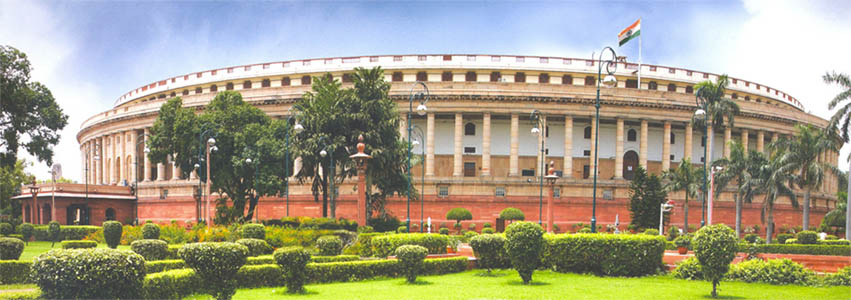Report by Shuchi Giridhar
The 2023 winter session of the Indian parliament lasted a total of 18 days with a total of 14 sittings.
It began on the 4th of December and was adjourned sine die or as the final adjournment on the 21st.
The session saw a total of 19 bills passed by both the Lok Sabha and Rajya Sabha.
What is the Lok Sabha and Rajya Sabha?
The parliament is comprised of the President and the two Houses of the Parliament. The upper house is the Council of States or the Rajya Sabha. The Rajya Sabha has the power to create laws on state lists to protect the rights of different states. The lower House of the parliament is the House of the People or the Lok Sabha. Bills are made and laws are passed for better governance of India. The Lok Sabha has a greater role in legislation.
What happened during the winter session?
This winter session saw the approval of many bills by the Parliament. In the session, 12 bills were introduced in Lok Sabha and a total of 18 bills were passed by Lok Sabha and 17 by Rajya Sabha. One bill was withdrawn with the leave of Rajya Sabha and three bills were withdrawn with the leave of Lok Sabha.
During the session on 12/12/2023, the first batch of additional grants required by the government to meet the necessary expenditure for 2023 – 2024 and the demands for the extra money provided to the Indian government for the years 2020 to 2021 were discussed and voted in full. The related appropriation bills were also introduced and passed by the Lok Sabha after a debate of 5 hours and 40 minutes.
These bills were returned by the Rajya Sabha on 19/12/2023 after a discussion of about 22 minutes.
The Security Breach
This session also experienced a security breach of the Lok Sabha where two persons entered the premises and sprayed gas from canisters while the Lok Sabha was in session.
The Discipline Issue
During this session, 100 Members of the Parliament were suspended from the Lok Sabha and 46 Members of the Parliament were suspended from the Rajya Sabha. This is the most members suspended by the Parliament. This is roughly 19% of the Lok and Rajya Sabha.
The Bills Passed
Three bills related to the criminal justice system were also passed by both Houses of the Parliament. These are the Bharatiya Nyaya Sanhita, 2023, the Bharatiya Nagarik Suraksha Sanhita, 2023 and the Bharatiya Sakshya Bill, 2023 and they are replacing the Indian Penal Code, the Code of Criminal Procedure, 1973 and the Indian Evidence Act, 1872.
A discussion under Rule 176 was held on the economic situation in the country by Shri Derek O’Brien, an MP. This discussion took over 10 hours and 25 minutes.
The productivity of the Lok Sabha was about 74% and that of the Rajya Sabha was around 79%.
What bills were passed by the parliament?
The bills passed by both Houses of the Parliament are –
1. The Advocates (Amendment) Bill, 2023.
2. The Jammu and Kashmir Reservation (Amendment) Bill, 2023.
3. The Jammu and Kashmir Reorganisation (Amendment) Bill, 2023
4. The Central Universities (Amendment) Bill, 2023
5. The Repealing and Amending Bill, 2023
6. The Jammu and Kashmir Reorganisation (Second Amendment) Bill, 2023
7. The Government of Union Territories (Amendment) Bill, 2023
8. The Post Office Bill, 2023
9. The Appropriation (No. 3) Bill, 2023
10. The Appropriation (No. 4) Bill, 2023
11. The National Capital Territory of Delhi Laws (Special Provisions) Second (Amendment) Bill, 2023
12. The Central Goods and Services Tax (Second Amendment) Bill, 2023
13. The Provisional Collection of Taxes Bill, 2023
14. The Bhartiya Nyaya Sanhita, 2023
15. The Bhartiya Nagarik Suraksha Sanhita, 2023
16. The Bhartiya Sakshya Bill, 2023
17. The Telecommunications Bill, 2023
18. The Chief Election Commissioner and other Election Commissioners (Appointment, Conditions of Service and Term of Office) Bill, 2023
19. The Press and Registration of Periodicals Bill, 2023
What are the important bills among these?
Some of the major bills are –
The Jammu and Kashmir Reservation (Amendment) Bill, 2023 is to change the title ‘weak and under-privileged classes’ (social castes) to ‘Other Backward Classes’ in the Jammu and Kashmir Reservation Act 2004
• The Jammu and Kashmir Reorganisation (Amendment) Bill, 2023 is to provide nomination of only two members, of which one should be a woman from the community of Kashmiri Migrants and one member from a Displaced person from Pakistan Occupied Jammu and Kashmir to the Jammu and Kashmir Legislative Assembly.
• The Central Universities (Amendment) Bill, 2023 is to establish a Central Tribal University in Telangana.
• The National Capital Territory of Delhi Laws (Special Provisions) Second (Amendment) Bill, 2023 was passed to extend the validity of the National Capital Territory of Delhi Laws (Special Provisions) Second Act, 2011 for three years from 01.01.2024 to 31.12.2026 this is to protect from punishable action to forms of unauthorised Developments in Delhi.
• The Press and Registration of Periodicals Bill, 2023 is to provide press, for the registration of periodicals and connected matters
• The Telecommunication Bill 2023 encourages the government to intercept messages during times of dire need and it allows the officials in charge to monitor and manage messages across the entire telecom network.
The three Bills related to criminal procedure, are, of course, the Bills that impact the highest number of Indian citizens.

